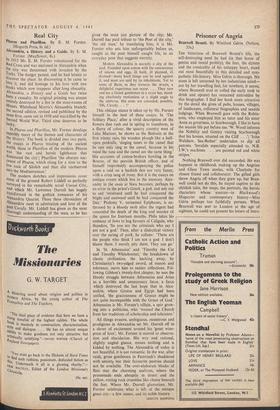Real City
Pharos and Pharillon. By E. M. Forster. (Hogarth Press, 8s. 6d.) IN 1915 Mr. E. M. Forster volunteered for the Red Cross and was stationed in Alexandria when thecity - was threatened with invasion by the Turks. The danger passed, and he had leisure to discover the place. In discovering it he came to love it, and did homage to his love with two books which now reappear after long obscurity. Alexandria, a History and a Guide has twice been a casualty. Its original printing was almost entirely destroyed by a fire in the store-rooms of Messrs. Whitehead Morris's Alexandria branch; the second edition, revised and published by the same firm, came out in 1938 and was killed by the Second World War. Third time deserves to be lucky.
ln,Pharos and Pharillon, Mr. Forster develops superbly many of the themes and characters of the History. The book is divided into two parts, the essays in Pharos treating of the ancient world, those in Pharillon of the modern. Pharos Was 'the vast and heroic lighthouse that dominated the city'; Pharillon 'the obscure suc- cessor of Pharos, which clung for a time to the low rock of Silsileh and then slid unobserved into the Mediterranean.'
The modern sketches and impressions cover some of the ground Robert Liddell so perfectly surveyed in his remarkable novel Unreal City, and which Mr. Lawrence Durrell has hugely transformed in the gothick romances of his Alexandria Quartet. These three chroniclers of Alexandria meet in admiration and love of the Poet Cavafy. Mr. Liddell has given us the most thorough understanding of the man, as he has
given the most just picture of the city; Mr. Durrell has paid tribute to 'the Poet of the city,' `the old man,' by translating him; it is Mr. Forster who sets him unforgettably before us, caught as the poet himself caught life, in an everyday pose that suggests eternity.
Modern Alexandria is scarcely a city of the soul. Founded upon cotton with the concurrence of onions and eggs, ill built, ill planned, ill
drained—many hard things can be said against it, and most are said by its inhabitants. Yet to
some of them, as they traverse the streets, a
delightful experience can occur. . . . They turn and see a Greek gentleman in a straw hat, stand- ing absolutely motionless at a slight angle to the universe. His arms are extended, possibly. 'Oh, Cavafy. . .
This oblique stance is taken up by Mr. Forster himself in the best of these essays. In 'The Solitary Place,' after a vivid description of the flowers that rush out in spring to transform, in a flurry of colour, the quarry country west of Lake Mariout, he shows us the Bedouin at the first winter rain, his wooden plough like a half- open penknife, 'singing tunes to the camel that he can only sing to the camel, because in his mind the tune and the camel are the same thing.' His accounts of cotton-brokers howling in the Bourse, of the peevish British officer, and of himself improbably accompanying the police upon a raid on a hashish den are very funny, with a crisp tang of irony. But it is the, essays on antique events which live in the memory. Alex- ander in the oasis at Siwa becomes, perhaps by an error in the priest's Greek, a god, and sets out to sail 'westward until he had conquered the Night and eastward until he had conquered the Day.' Ptolemy V, surnamed Epiphanes, is en- throned by a bloody mob after the regent had concealed the death of the king and murder of the queen for fourteen months. Philo takes his embassy of Jews to beg favours of Caligula, who thunders, 'So you are the criminals who say I am not a god.' Then, after a dialectical victory over the eating of pork, he softens: 'These are the people who think I am not a god. I don't blame them. I merely pity them. They can go.'
In 'St. Athanasius' and 'Timothy the Cat and Timothy Whitebonnet,' the breakdown of classic civilisation, the hacking away, by Christianity's two-edged sword, of reason and tolerance, move him to sadder reflections. Fol- lowing Gibbon's twenty-first chapter, he sees the bloody struggle between Athanasius and Arius as a horrible and unnecessary farce, a farce which destroyed the last hope that in Alex- andria, where Greece and Egypt had been unified, 'the graciousness of Greece might be not quite incompatible with the Grace of God.' Athanasius is Mr. Forster's villain, a spiv grow- ing into a politician, who 'weaned the Church from her traditions of scholarship and tolerance.'
All things evasive, ambiguous, monstrous and prodigious in Alexandria set Mr. Durrell off in a slaver of excitement around his 'great wine- press of love'; Mr. Forster is moved to observa- tion and elucidation. His wry and rational, slightly angled glance, misses nothing and is kidded by nothing. The Alexandria of today is not beautiful, it is not romantic. In the war, after raids, gross gentlemen in Pastroudi's shuddered with anxiety lest their fayourite pastries should not be available. The over-elaborate blocks of flats mar the charming seafront, where the promenade ends abruptly in desert and the yellow, rotting rock crumbles like cheese beneath the feet. Where Mr. Durrell glamorises, Mr. Forster celebrates what is left of the antique great city—a few stones, and its noble history.
MARTIN MANNING


































 Previous page
Previous page